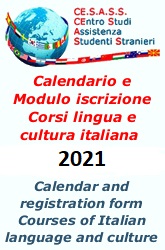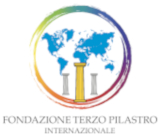- Home
- L'Ateneo
- Didattica
- Ricerca e Centri universitari
- Studenti
- Biblioteca
- Comunicazione
- Webmail
Corsi ordinari di lingua italiana - EN
- Dettagli
- Categoria: Corsi di Lingua
- Creato Giovedì, 31 Gennaio 2013 11:33
- Ultima modifica il Venerdì, 26 Luglio 2019 08:30
- Pubblicato Giovedì, 31 Gennaio 2013 11:33
- Scritto da Super User
| |
|
| Calendario 2020 |
|
For information about the schedule, the programs, the exams and the credits of the italian language and culture courses, please write to:
Questo indirizzo email è protetto dagli spambots. E' necessario abilitare JavaScript per vederlo.
|
Italian Language Courses
The University for Foreigners of Reggio Calabria organizes monthly and bimonthly, ordinary and intensive courses of the Italian language.
The courses are organized in monthly modules. The student may attend a bi-monthly or just a month of course. All courses conclude with an examination, designed to test the program carried out (Final Test).
The purposes and programs of intensive courses match those of the first five levels (A1-A2-B1-B2-C1-C2) with an increased hours of teaching and a more personalized method in comparison with the standard courses.
The classes are generally constituted by an average number of 15 students.
The attendance to the courses allows the acquisition of language skills necessary to access to Italian Universities. There is a minimum of hours of attendance to be admitted to do the final test. The total hours will be communicated by the teachers at the beginning of the course.
As for admission to courses, all foreign students who are at least 16 years of age can register and can access at any time, except for the A1 course, which can be accessed within the first two days of lessons.
Attendance is mandatory. It is necessary to mature 80% of the total hours of courses and linguistic-cultural modules in order to do exams and to receive a certificate of the attended course.
Participation (certified) to conference activities and educational trips can accredit attendance hours on the basis of what the College of Teachers will establish from time to time.
At the end of the course, those - who have diligently attended classes - will receive a certificate of attendance. Moreover, at the end of each month it is possible to receive a certificate of attendance with credits CFU/ECTS and an evaluation marked up to 30. The minimum to pass the exam is 18/30.
Certificates are valid in Italy and abroad. Each Certificate issued by the University for Foreigners, is valid for access to all the Italian universities, which require proof of competence in Italian language.
It will also be released - to those who request it and who have regularly attended classes - a Statement of frequency, which will specify the attended hours and the level. The University for Foreigners also issues its own Official Certification, called Ce.Col., also valid in Italy and abroad.
As for the three-monthly courses: student can perform a test at the end of each module.
Structure of the ordinary and intensive courses
Each credit will be valid at the Universities participating in the system and only in Italian language and culture courses at the same level for which they have been achieved up to the achievement of the level certificate. Only CFU / ECTS related to Diploma of Level I (C1) and those for the Diploma of II level (C2) are expendable at the Degree courses of the universities participating in the system, subject to the prior approval of the competent academic authorities.
The division of CFU / ECTS and examinations to achieve (you can achieve the CFU / ECTS also attending supplementary courses, trips and conferences, as provided from time to time by the College of Teachers and advertised on the notice boards and on the website of 'University) is organized as follows:
Credits (CFU/ECTS) for the ordinary courses:
| A1 > 8 CFU : 80 lesson hours |
| A2 > 8 CFU 80 lesson hours |
| B1 > 18 CFU (6 for each module) lesson hours per a three-month period: 180 |
| B2 > 20 CFU (7/7/6) 80 lesson hours per a three-month period: 210 |
|
C1 > 22 CFU (8/7/7) plus 8 CFU/ECTS (laboratories, conferences...) lesson hours per a three-month period: 240 |
|
C2 > 48 CFU (8 for each module) plus 12 CFU/ECTS (laboratories, conferences...) lesson hours per a six-month period: 540 |
Credits (CFU/ECTS) for intensive courses:
| A1 > 8 CFU/ECTS lesson hours 80 |
| A2 > 8 CFU/ECTS lesson hours 80 |
| B1 > 7 CFU/ECTS lesson hours 84 |
| B2 > 8 CFU/ECTS lesson hours 90 |
| C1 > 8 CFU/ECTS lesson hours 90 |
| C2 > 8 CFU/ECTS lesson hours 90 |
Classification in credits for each skill:
| Ordinary Courses | Intensive Courses |
|
A1 > 8 CFU/ECTS (2 reading comprehension, 2 listening comprehension, 2 writing production, 2 speaking) |
A1 > 8 CFU/ECTS (2 reading comprehension 2 listening comprehension, 2 writing production, 2 speaking |
| A2 > 8 CFU/ECTS (2 reading comprehension, 2 listening comprehension, 2 writing production, 2 speaking) | A2 > 8 CFU/ECTS (2 reading comprehension, 2 listening comprehension, 2 writing production 2 speaking) |
| B1 > 18 CFU/ECTS (4 reading comprehension, 4 listening comprehension, 5 writing production, 5 prod. orale). 6 credits for each module (1 reading comprehension, 1 listening comprehension, 2 writing production, 2 speaking) | B1 > 7 CFU/ECTS (2 reading comprehension, 1 listening comprehension, 2 writing production, 2 speaking |
|
B2 > 20 CFU/ECTS (5 reading comprehension, 5 listening comprehension, 5 writing production, 5 speaking). |
B2 > 8 CFU/ECTS (2 reading comprehension, 2 listening comprehension, 2 writing production, 2 speaking). |
|
C1 > 22 CFU/ECTS |
C1 > 8 CFU/ECTS (2 reading comprehension, 2 listening comprehension, 2 writing production, 2 speaking) |
|
C2 > 48 CFU/ECTS |
C2 > 8 CFU/ECTS (2 reading comprehension, 2 listening comprehension, 2 writing production, 2 speaking) |
For costs of the course scheduled until June 26th, please visit this webpage: http://www.unistrada.it/en/teaching/2013-02-08-08-37-1/2013-02-08-08-44-1/procedures-of-enrollment-and-payment
The C2 ordinary course lasts three months.
Access to the second-level advanced course (C2) is allowed to those who:
- Have obtained the certificate of proficiency in Italian first-level Advanced Course (C1)
- Have been assigned to the advanced course, according to the entry test;
- Have an equivalent official certificate of proficiency, belonging to the CLIC group (CELI; CILS; PLIDA; IT ROMA TRE).
Lesson timetable
Lessons take place in the morning from Monday to Friday, from 9,00 am to 12,30 am, with a break from 10,30 am to 11,00 am. Each hour of lesson is composed of 45 minutes.
All courses (A2 - B1 - B2 - C1 – C2), except A1, have also lessons from 13.15 to 14.45.
The College of Teachers may approve a reduction of working hours and costs for A1 courses which are attended by no more than three students.
(weekly or bi-weekly)
Students are given the opportunity to attend courses for one or two weeks, within the ordinary courses. The program is the same as ordinary courses.
At the end of the week / weeks students will receive a certificate of attendance with the number of hours worked.
| COSTS | |
| Weekly Attendance | 100 Euros |
| Bi-weekly attendance (Period: Autumn, Winter, Spring) | 150 Euros |
| Bi-weekly attendance (Period: Summer) | 175 Euros |
Common European Framework of Reference for Languages
The CEFR (Common European Framework of Reference for Languages), otherwise referred to by the acronym CEFR (Common European Framework), is a guideline used to describe the skills achieved by those who study a European foreign language.
The reference levels, in which the CEFR is articulated are 6: A1, A2, B1, B2, C1 and C2. The six levels of competence (A1, A2, B1, B2, C1, C2) articulated in the CEFR are used throughout Europe and in other continents as parameters to provide teachers of language with a reference model for the preparation of teaching materials and the assessment of language skills.
| COMMON EUROPEAN FRAMEWORK OF REFERENCE FOR LANGUAGES (CEFR) | |
| A1 Beginner Level |
Can understand and use familiar everyday expressions and very basic phrases aimed at the satisfaction of needs of a concrete type. Can introduce him/herself and others and can ask and answer questions about personal details such as where he/she lives, people he/she knows and things he/she has. Can interact in a simple way provided the other person talks slowly and clearly and is prepared to help. |
| A2 Elementary Level |
Can understand sentences and frequently used expressions related to areas of most immediate relevance (e.g. very basic personal and family information, shopping, local geography, employment). Can communicate in simple and routine tasks requiring a simple and direct exchange of information on familiar and routine matters. Can describe in simple terms aspects of his/her background, immediate environment and matters in areas of immediate need. |
| B1 Intermediate level |
Can understand the main points of clear standard input on familiar matters regularly encountered in work, school, leisure, etc. Can deal with most situations likely to arise whilst travelling in an area where the language is spoken. Can produce simple connected text on topics which are familiar or of personal interest. Can describe experiences and events, dreams, hopes & ambitions and briefly give reasons and explanations for opinions and plans. |
| B2 Upper Intermediate |
Can understand the main ideas of complex text on both concrete and abstract topics, including technical discussions in his/her field of specialisation. Can interact with a degree of fluency and spontaneity that makes regular interaction with native speakers quite possible without strain for either party. Can produce clear, detailed text on a wide range of subjects and explain a viewpoint on a topical issue giving the advantages and disadvantages of various options. |
| C1 Advanced Level |
Can understand a wide range of demanding, longer texts, and recognise implicit meaning. Can express him/herself fluently and spontaneously without much obvious searching for expressions. Can use language flexibly and effectively for social, academic and professional purposes. Can produce clear, well-structured, detailed text on complex subjects, showing controlled use of organisational patterns, connectors and cohesive devices. |
| C2 Proficiency Level |
Can understand with ease virtually everything heard or read. Can summarise information from different spoken and written sources, reconstructing arguments and accounts in a coherent presentation. Can express him/herself spontaneously, very fluently and precisely, differentiating finer shades of meaning even in the most complex situations. |
Ateneo
Corsi di Lingua Italiana
Promotori
Servizi Informatici d'Ateneo










